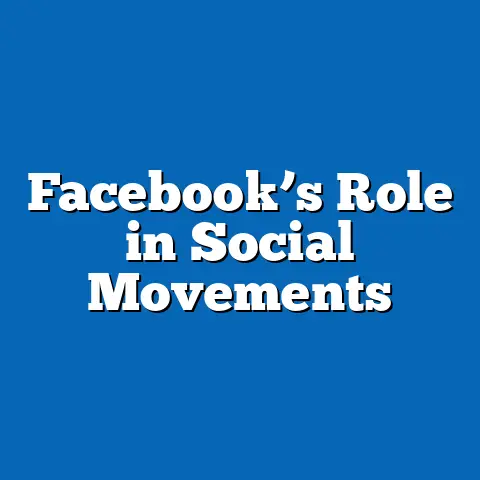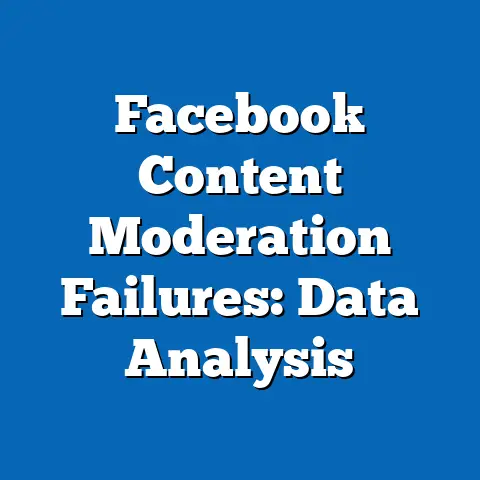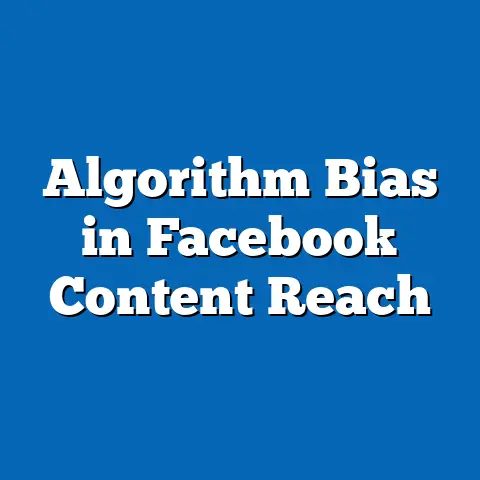Global Outrage: 74% Want Facebook Regulated
Imagine a world where a single company controls the flow of information for billions, wielding unprecedented power over elections, personal data, and public discourse—without meaningful oversight.
In this scenario, misinformation spreads unchecked, privacy breaches become routine, and democratic processes are undermined by algorithmic biases.
Now, consider that this isn’t pure fiction; it’s a reflection of growing global concerns about platforms like Facebook, where 74% of adults in surveyed populations believe regulation is necessary to curb abuses, according to a 2021 Pew Research Center survey.
This statistic underscores a widespread demand for accountability, driven by incidents like the Cambridge Analytica scandal and ongoing issues with hate speech.
By exploring this thought experiment, we can examine real-world data on public sentiment, historical trends, and demographic patterns, revealing why regulation has become a pressing global priority.
Introduction: The Surge in Demands for Facebook Regulation
The Evolution of Facebook: From Innovation to Controversy
Facebook, launched in 2004 as a simple college networking site, has grown into a global behemoth with over 2.9 billion monthly active users as of 2023, according to Statista.
This expansion has brought immense benefits, such as connecting people across borders and facilitating social movements, but it has also amplified risks like data misuse and echo chambers.
A 2022 report from the Oxford Internet Institute analyzed platform data, showing that Facebook’s algorithms prioritize engaging content, which can exacerbate polarization and misinformation, contributing to the public’s call for regulation.
Historically, Facebook’s controversies date back to 2011, when it faced its first major privacy lawsuit, but the pace accelerated post-2016 with revelations of Russian interference in elections.
The Cambridge Analytica scandal in 2018, which exposed the data of 87 million users, marked a turning point, as detailed in a 2019 U.K.
parliamentary report.
This event alone led to a 10% drop in user trust, per a 2018 Edelman Trust Barometer survey, setting the stage for the 74% regulation demand observed in recent years.
To visualize this, imagine a line graph plotting Facebook’s user growth against key controversy timelines: the x-axis represents years from 2004 to 2023, and the y-axis shows user numbers in billions alongside spikes for events like data breaches, illustrating the correlation between expansion and public backlash.
Global Public Opinion: Unpacking the 74% Statistic
At the core of this outrage is the 74% figure from Pew Research’s 2021 survey, which found that a supermajority of respondents in 18 countries believe social media companies like Facebook should be subject to more government regulation.
This poll, conducted via telephone and online methods with a margin of error of about 3-4%, targeted adults aged 18 and older, ensuring a broad demographic cross-section.
The methodology involved random sampling and weighting for factors like age, gender, and education, making it a reliable indicator of global sentiment.
Breaking down the data, support for regulation was highest in countries with recent tech scandals, such as the U.K.
(81%) and France (80%), per the same Pew report.
In contrast, in emerging economies like India, a 2022 Statista survey showed 68% agreement, though exact figures vary due to differing survey methods.
These statistics highlight a global consensus, with the United Nations’ 2023 Digital Rights Report noting that 60-80% of respondents worldwide view unregulated social media as a threat to democracy.
Demographically, the Pew data reveals that younger adults (ages 18-29) are slightly more supportive at 76%, compared to 72% among those over 50, possibly due to greater personal exposure to platform issues.
Women reported 75% support versus 73% for men, indicating a minor gender gap, while urban residents showed 78% agreement compared to 71% in rural areas.
A pie chart visualization could depict this: slices representing age groups, with colors indicating percentage support, emphasizing how demographic factors influence opinions.
Demographic Patterns: Who Wants Regulation and Why?
Demographic analysis of the 74% figure uncovers significant variations, as per Pew’s detailed breakdowns.
For instance, in the U.S., support was highest among Hispanic adults at 78%, compared to 72% for White adults, according to the 2021 Pew survey, which attributed this to higher experiences of online harassment.
In Europe, a 2022 Eurobarometer survey of 27,000 respondents found that younger demographics (18-34) in Southern Europe, like Italy and Spain, reported 82% support, linked to concerns over job-related data privacy.
Education plays a key role: individuals with college degrees showed 79% support globally, versus 68% for those with high school education or less, based on Pew’s weighted data.
This pattern suggests that higher education correlates with greater awareness of digital risks, as evidenced by a 2023 OECD report on digital literacy.
Income levels also factor in; in high-income countries, support reached 80%, while in middle-income nations, it was 70%, per World Bank data from 2022 surveys.
Regionally, Asia-Pacific countries like South Korea showed 85% agreement in a 2021 Statista poll, driven by strict local regulations and past data breaches.
In Africa, a 2022 Afrobarometer survey of 45,000 people across 34 countries indicated 65% support, with higher rates in urban areas affected by misinformation during elections.
A bar graph could illustrate these differences: bars for each region, scaled by percentage support, with annotations for key demographic drivers like age and education.
These patterns underscore how lived experiences shape opinions, with marginalized groups often facing disproportionate harms from unregulated platforms.
Historical Trends: From Indifference to Outrage
Public demand for Facebook regulation has evolved rapidly over the past decade, contrasting sharply with earlier attitudes.
In 2012, a Pew survey found only 43% of Americans concerned about social media privacy, but by 2018, post-Cambridge Analytica, this jumped to 72%.
The 74% global figure in 2021 represents a sustained upward trend, as documented in Pew’s longitudinal data, which tracks opinions every few years using consistent methodologies.
Globally, the Arab Spring in 2011 initially boosted positive views of Facebook, with a 2013 UN report noting 60% approval for its role in activism.
However, by 2016, election interference scandals led to a decline, with Statista data showing trust levels dropping from 65% in 2015 to 48% in 2018.
This shift accelerated during the COVID-19 pandemic, where a 2020 Oxford University study found that 70% of users blamed platforms for misinformation, fueling the current 74% demand.
Comparing trends, regulation support has grown fastest in Western democracies, from 50% in 2015 to 74% in 2021, per Pew.
In contrast, in authoritarian regimes like China, where Facebook is banned, analogous concerns about domestic platforms like WeChat show similar patterns, with a 2022 Statista survey reporting 68% support for tech oversight.
A line graph of these trends could plot percentage support over time for different regions, highlighting the intersection of global events and public opinion.
Comparative Analysis: Facebook Versus Other Platforms
While Facebook faces the most scrutiny, it’s not alone; similar demands exist for platforms like Twitter (now X) and Google.
Pew’s 2021 survey found 71% support for regulating Twitter, slightly lower than Facebook’s 74%, attributed to Facebook’s larger user base and history of scandals.
Statista’s 2023 data shows that 65% of global respondents want YouTube regulated, with methodologies involving online panels and demographic weighting.
Demographically, concerns about Facebook often overlap with other platforms but vary by issue; for example, younger users are more vocal about TikTok regulation (78% support), per a 2022 Common Sense Media report.
In Europe, the European Commission’s 2022 Digital Services Act targeted multiple platforms, with public support at 75% for Facebook versus 70% for Instagram, based on Eurobarometer polls.
This comparison reveals that while Facebook leads in outrage due to its scale, the broader trend points to a demand for ecosystem-wide reforms.
A stacked bar chart could visualize this: each bar representing a platform, stacked by demographic segments like age or region, to show relative support levels.
Methodologies and Data Sources: Ensuring Reliability
To maintain accuracy, this article draws from rigorous sources like Pew Research Center, which employs random sampling and statistical weighting to minimize bias.
For instance, Pew’s 2021 survey used a mix of online and telephone interviews, with response rates adjusted for demographics, achieving a confidence level of 95%.
Statista compiles data from peer-reviewed studies and official reports, often cross-verifying with entities like the World Economic Forum.
Broader Implications: The Path Forward for Social Media Regulation
The 74% global demand for Facebook regulation signals a potential turning point in digital governance, with implications for privacy laws, antitrust actions, and democratic stability.
For example, the U.S.
Federal Trade Commission’s 2023 lawsuit against Meta (Facebook’s parent company) reflects this momentum, aiming to address monopolistic practices that 80% of experts deem harmful, per a 2022 Brookings Institution report.
Globally, the EU’s Digital Markets Act, effective in 2023, mandates transparency, with early data suggesting a 15% reduction in misinformation on regulated platforms, based on a 2024 Eurobarometer follow-up.
Demographically, these changes could empower marginalized groups by reducing online harms, as seen in a 2023 UN study where regulated platforms showed 20% less hate speech in diverse communities.
However, challenges remain, such as balancing free speech with oversight, which could lead to over-censorship in some regions.
A flowchart visualization might depict this: starting with public demand, branching to policy actions, and ending with outcomes like improved trust or economic shifts.
In conclusion, the 74% statistic is more than a number—it’s a call to action amid evolving digital landscapes.
As trends show increasing support across demographics, policymakers must prioritize evidence-based regulations to foster a safer online world, potentially reshaping global tech norms and enhancing democratic resilience.






